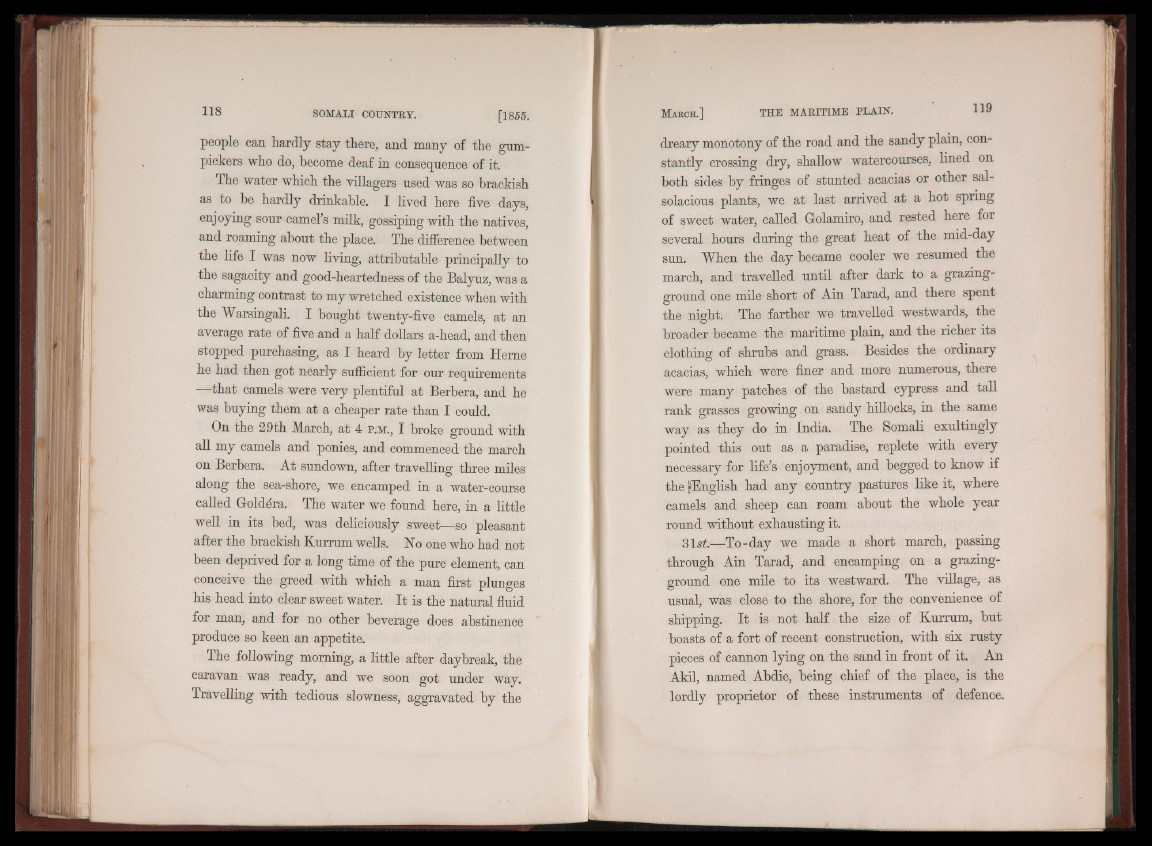
people can hardly stay there, and many of the gum-
pickers who do, become deaf in consequence of it.
The water which the villagers used was so brackish
as to be hardly drinkable. I lived here five days,
enjoying sour camel’s milk, gossiping with the natives,
and roaming about the place. The difference between
the life I was now living, attributable principally to
the sagacity and good-heartedness of the Balyuz, was a
charming contrast to my wretched existence when with
the Warsingali. I bought twenty-five camels, at an
average rate of five and a half dollars a-head, and then
stopped purchasing, as I heard by letter from Heme
he had then got nearly sufficient for our requirements
—that camels were very plentiful at Berbera, and he
was buying them at a cheaper rate than I could.
On the 29th March, at 4 p.m., I broke ground with
all my camels and ponies, and commenced the march
on Berbera. At sundown, after travelling three miles
along the sea-shore, we encamped in a water-course
called Grolddra. The water we found here, in a little
well in its bed, was deliciously sweet—so pleasant
after the brackish Kurrum wells. No one who had not
been deprived for a long time of the pure element, can
conceive the greed with which a man first plunges
his head into clear sweet water. I t is the natural fluid
for man, and for no other beverage does abstinence
produce so keen an appetite.
The following morning, a little after daybreak, the
caravan was ready, and we soon got under way.
Travelling with tedious slowness, aggravated by the
dreary monotony of the road and the sandy plain, constantly
crossing dry, shallow watercourses, lined on
both sides by fringes of stunted acacias or other sal-
solacious plants, we at last arrived at a hot spring
of sweet water, called Golamiro, and rested here for
several hours during the great heat of the mid-day
sun. When the day became cooler we resumed the
march, and travelled until after dark to a grazing-
ground one mile short of Ain Tarad, and there spent
the night. The farther we travelled westwards, the
broader became the maritime plain, and the richer its
clothing of shrubs and grass. Besides the ordinary
acacias, which were finer and more numerous, there
were many patches of the bastard cypress and tall
rank grasses growing on sandy hillocks, in the same
way as they do in India. The Somali exultingly
pointed this out as a paradise, replete with every
necessary for life’s enjoyment, and begged to know if
the ^English had any country pastures like it, where
camels and sheep can roam about the whole year
round without exhausting it.
31 si.—To-day we made a short march, passing
through Ain Tarad, and encamping on a grazing-
ground one mile to its westward. The village, as
usual, was close to the shore, for the convenience of
shipping. I t is not half the size of Kurrum, but
boasts of a fort of recent construction, with six rusty
pieces of cannon lying on the sand in front of it. An
Akil, named Abdie, being chief of the place, is the
lordly proprietor of these instruments of defence.